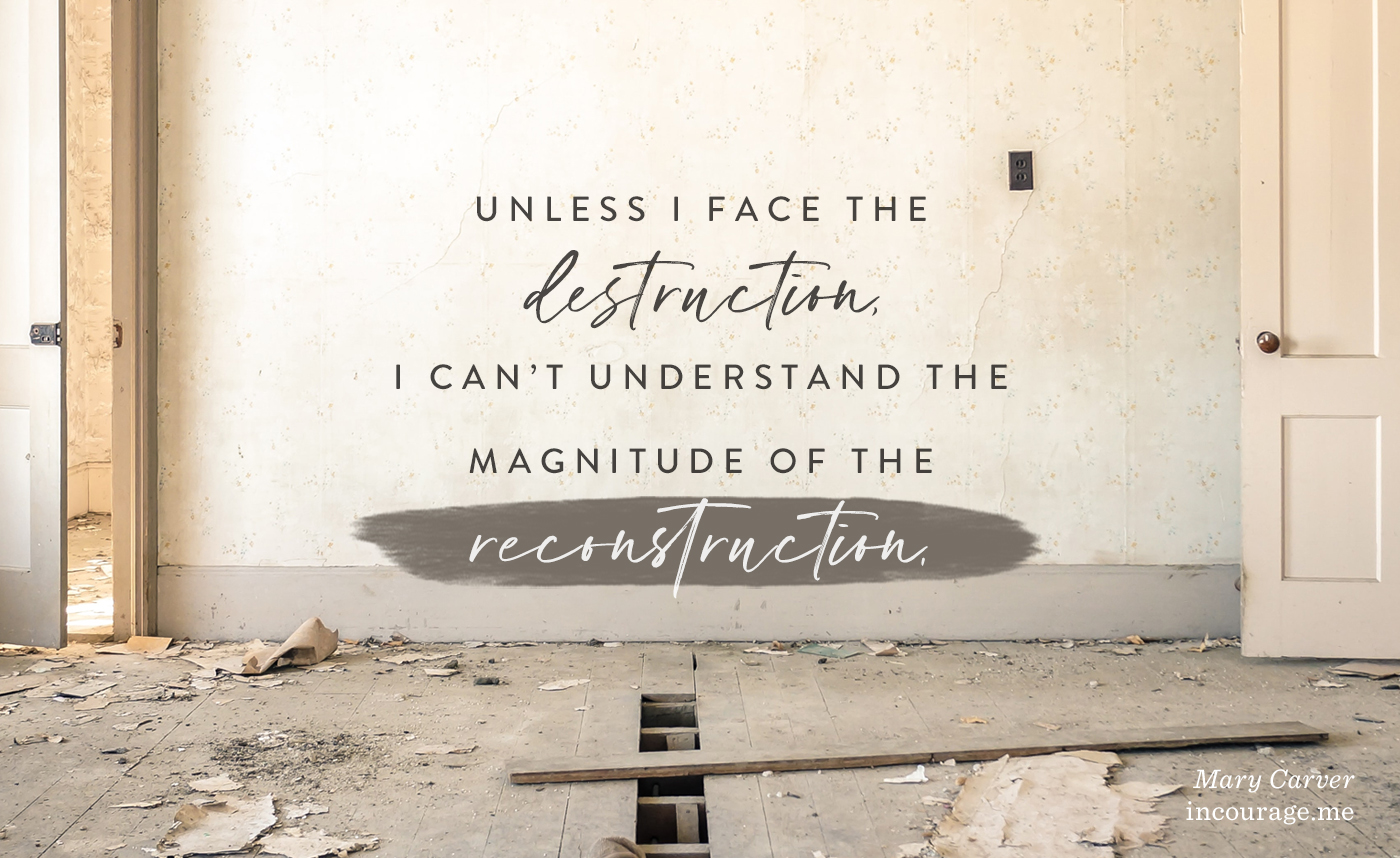Dear friends, we are God’s children now, and what we will be has not yet been revealed. We know that when he appears, we will be like him because we will see him as he is. And everyone who has this hope in him purifies himself just as he is pure.
1 John 3:2-3 (CSB)
A few weeks ago, I noticed a house in our neighborhood that was falling apart. More than a cracked driveway or peeling paint, this was major disintegration at a rapid rate. And I was super annoyed to see it.
As I drove by that first day, I felt my nose wrinkle and my lip curl in disgust. I assumed that the house in question was simply being neglected, although perhaps it had been completely abandoned. Either way, the lack of attention and care being given the home bothered me — enough that I actually drove a block out of my way to avoid seeing it.
Over the next few days, I realized that someone was actually rehabbing this house. The tearing down was intentional, and a building up was surely coming soon. Strangely enough, that wasn’t enough for this judgmental neighbor. Even though I knew this house was in the process of transformation, I still felt my lip curl as I glanced toward the siding-less house with the overgrown weeds. I did think, with some curiosity, Huh. So that’s what a house looks like under siding. But my response to that thought was immediate and dismissive: Gross.
I know myself. When the work on that house is finished, I’ll be genuinely delighted. On the day I drive by and see a brand new, beautiful house standing where a pile of wood stood just a few weeks prior, I will be genuinely impressed by my neighbor’s hard work and commitment to improving their home.
And yet, while I know I can only truly appreciate the “after” picture in comparison to the “before” shot, I really did not want to witness the in-between. And though I say that I appreciate a homeowner’s labor of love involved in rehabbing a house, the truth is, I didn’t actually want to see the mess or sweat or tears involved.
Transformation — whether we’re talking about a house or a heart — is not a pretty process. True rehabilitation, true change, only happens when the old, crumbling, moldy, and rusty parts are stripped away, revealing the naked truth underneath. It’s only when we are elbow deep in mud and muck that we can see the strong, shining bones below on which we can build something beautiful.
Even during seasons of reflection and repentance, we can be tempted to put too much emphasis on the “after” part of a transformation. Sure, everyone loves gasping and applauding at the big reveal at the end of a home improvement show. And it is absolutely inspiring to read about someone’s triumph over adversity.
But what about when that excavation and rehabilitation takes place in our hearts and our lives? When we are only willing to direct our gaze on the after pictures, we’re missing the hard-fought beauty of that behind-the-scenes battle. We’re missing out on the chance to more fully understand the sacrifice that led to the victory, to more completely appreciate the reward that only came as a result of the work. And we’re missing the whole truth about who we are and how vast the gap between “before” and “after” truly is.
It took me a while, but I realize now that the day my neighbor’s house was at its ugliest and messiest was actually the most amazing one of its entire transformation. Because without that day, I couldn’t possibly appreciate its new siding and shutters and landscaping and front porch light. Unless I face the destruction, I can’t understand the magnitude of the recreation.
This truth is no different when it comes to our journey to the cross during this Lent season. If I wait until I’ve “got it all together” to reveal my struggles, I’m robbing God of the opportunity to shine through my ugliness and my mess. I’m forgetting that He is the only one who can make me a new creation, and He won’t transform me until I lay myself bare before Him and let Him get to work.
When my house is falling apart, that is the time to open up to God and to others. Not later. Not when I get it figured out. Not when I’ve painted and polished and perfected it all. If I waited for that day, I’d never have a story to tell, for we are all in constant change, constant sharpening and growing and transforming. So when our houses are falling apart, that is the day we should look up, accept the Lord’s help, and meet our neighbor’s eyes. Doing this will undoubtedly help us be more patient, more gentle — with each other and with ourselves. And as we turn to the cross and the One who loves us at our ugliest and promises to redeem our worst messes, it will certainly reveal to us the true beauty of transformation.
Excerpt from Journey to the Cross: Forty Days to Prepare Your Heart for Easter by Mary Carver.
It’s not too late to have a meaningful Lenten season. Let us send you a FREE sampler from our Lenten devotional, Journey to the Cross! Journey to the Cross: Forty Days to Prepare Your Heart for Easter was written with women of all stages in mind so that we can all better experience the power and wonder of Easter with intentionality and depth. We hope it will bless your Lenten season.








Mary/(in)courage,
I’ve really been enjoying the “Journey to the Cross” devotional. It is helping me to truly prepare my heart for the glory of Easter Sunday. Like you said, we need to walk through the ugly to get to the beauty. I’m so glad that God loves me enough to tear me down, strip away all that is not of Him, and then lovingly build me into someone who looks more like His Son. It’s a painful process and not too pretty to look at, but oh so necessary. There is something to be said for going with a humble and contrite heart before our Maker in order to truly appreciate what He did for us. Lovely post!
Blessings,
Bev xx
I’m so glad the book has been encouraging you to, Bev!
Wow… this post really made me think… yes, as we deal with those people who don’t have it all together yet, let’s be patient, pray and support them… and remember how patient God is remaking yourself ⚓️
Thankyou Mary..
Beautiful! Purposely changing our perspective to what WILL be, not what IS at the moment. Eyes of faith and trust that God is ever at work and NEVER leaves anything of any one of His children undone and unfinished. What work He began He will finish. The brokenness produces a vessel much more beautiful than what was before the brokenness. Thank you for sharing this beautiful truth!
Donna
Maybe that’s why he allowed certain things to happen to me! Thank you for your post and Thank you God!
This statement caught my attention: “I will be genuinely impressed by my neighbor’s hard work and commitment to improving their home.” The same holds true among genuine brothers and sisters in Christ. We are genuinely impressed by another’s hard work to train themselves for godliness (1 Timothy 4:7) and commitment to improving their lives. I suppose it’s pride keeping us from sharing the process!
Thanks for this. My first thought was of a couple people I know who seem to keep slapping up siding on the outside to keep it looking good to everyone else, but it is still crumbling inside. My next thought: Maybe they are only able to pull up one old nail at a time, or one old board at a time. It’s not up to me to judge their rate of progress (even though I might want to… and sometimes still do…) My next thought: I still got PLENTY of personal home repair projects on this ole house of mine, and the older I get, the more things I notice. I have to keep reminding myself that spiritual growth is a direction….
This is such an important message for us to hear and put into practice! Our desire to avoid seeing the messiness of works in progress is way too strong in the church as a whole. As a result, many of us wait until we’ve got it all together before revealing our struggles. (Or we just continue to fall apart for lack of support.)
Ezekiel 34:4 expresses judgment on the spiritual leaders of that time, as God declares, “You have not strengthened the weak or healed the sick or bound up the injured. You have not brought back the strays or searched for the lost.” They were having the same trouble we do—feeling disgusted with those who were in a state of decay, rather than exhibiting the attitude of Isaiah 42:3: “A bruised reed he will not break, and a smoldering wick he will not snuff out.” (Applied to Jesus in Matthew 12:20.)
How many Christians who are struggling with substance abuse, failing marriages, sexual immorality, mental illness, or other forms of suffering are more like bruised reeds in need of support than defiant sinners in need of discipline? How often do people in the church break those reeds and snuff out those wicks rather than strengthening the weak, healing the sick, binding up the injured, bringing back the strays, and searching for the lost of our own flock? (Adapted from my blog at https://thosewhoweep.blogspot.com/2018/08/strengthening-weak.html.)
From what I’ve seen over the last forty years, we’re improving, but until we do this more consistently, those who are hurting the most will continue to hide the old, crumbling, moldy, and rusty parts inside.
Thank you so much for bringing this issue out into the open, and for doing it in such a personal way.
Mary,
God is constantly shaping & molding us into the person He wants us to be. We shouldn’t wait till we’ve got it all together, because that day/time will never come. We are commanded to share one another’s burdens. God already knows about our struggles, but we can let Him heal us & our wounded spirits. Others need to hear of our struggles for two reasons. Number one is they won’t feel alone in their struggles. Secondly they can encourage & pray for you. Watching & hearing of your transformation gives them hope that one day they can be renewed.
Blessings 🙂
Letting people in on our renovations of the heart is scary. But it may also encourage them to do some of their own renovations.